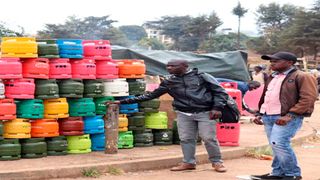
A customer shops for cooking gas in Kibera, Nairobi.
| Dennis Onsongo I Nation Media GroupBusiness
Premium
How corruption, red tape blocked gas project, sinking Sh1bn
Millions of poor Kenyans will continue to cook using harmful fuels, as a rescue plan through distribution of subsidised gas cylinders is blocked by corruption and bureaucratic hitches.
The Mwananchi Gas project, launched in 2016 to support poor households have better access to cleaner modes of cooking through the subsidised gas cylinders, burners and grills, is almost dead, and now risks sinking about Sh1 billion spent on the project.
According to the Auditor General’s reports, the project, which was initially to be implemented by the defunct Ministry of Energy and Petroleum beginning 2016, but which was later handed over to the National Oil Corporation of Kenya (Nock), has not achieved its objective to date, as Nock and the State Department for Petroleum derail the process to supply the remaining products to thousands of Kenyans.
Implementation of the Mwananchi Gas Project started in 2017, with purchase of thousands of gas cylinders, burners and grills. However, it would later be revealed that a corruption cartel that reigned over tender deals for supply of the products, resulted in supply of only about 60 percent of the products.
Auditor General Nancy Gathungu, in her audit report for Nock last year, scrutinised the spending of millions of public funds in the project, yet value for money had not been established.
“Records made available by the corporation indicated that a total of 144,092 6kg gas cylinders, 357,360 cylinder grills and 357,336 gas burners valued at Sh539,741,103 were received from the State Department for Petroleum. Of these quantities, the corporation, jointly with the State Department for Petroleum inspected and certified the use of 45,797 cylinders, 40,484 gas burners and 114,680 grills with an aggregate value of Sh56,419,124.
Transfer ownership
“The remainder of the items had not been included in the agency’s financial statements and the management has attributed the omission to lack of formal authority from the State Department for Petroleum to transfer ownership of the items to the corporation,” Ms Gathungu stated in her 2018/19 Nock audit report.
This was out of the 150,768 gas cylinders, 272,567 grills and 357,355 burners that were supplied to the State Department in 2017.
By June 30, 2018, the state department had spent a total of Sh870,339,283 on the project, that also included the purchase of 161 40-foot containers for storage and subsidised refilling of the gas cylinders.
But now, responding to last year’s audit queries, the Nock management blames the state department for failing to communicate how Nock was supposed to handle the products after the 2018 handing over of the project, for the delays in distribution.
“The corporation received Mwananchi gas cylinders and accessories in FY2017/18. Since there was no clear communication from the Ministry of Energy and Petroleum on how the corporation was to treat the Mwananchi gas cylinders and accessories, the cylinders and accessories were accounted for in the books as an asset (inventory) with a corresponding liability,” the management says.
Nock says it has unsuccessfully tried writing to the state department seeking ownership of the project.
“Management wrote a letter to the ministry, making recommendations to address the ownership and management of cylinders and accessories, and a second letter addressing the price buildup and subsidy applied on the cylinders and accessories. This was intended to ensure that the ministry transfers ownership of the cylinders to National Oil and that the ministry also gives concurrence on the pricing of the cylinder and accessories. Approval was given by the ministry to apply a subsidy of 65 percent on the landed cost of the cylinders and accessories in the buildup of the prices to the end users with overall concurrence on the proposed price of Sh2,150 for a complete cylinder set. (Letter reference MOPM 68B/3/2/Vol IV dated October 11, 2018),” states the management.
The corporation says the ministry has not responded to its request through a letter dated September 11, 2018, asking to have full ownership and custody of the products, after the project was transferred to it.
This, according to Nock, has been the reason the project was shelved, even as millions of poor households that ought to have been helped through distribution of the gas cylinders and accompanying clean cooking equipment, continue to cook using paraffin, firewood, charcoal and other harmful means.
According to previous auditor general reports, the defunct ministry in May 2017 contracted 10 firms to supply various components of the project, at an aggregate cost of Sh999,975,230.
357,355 gas cylinders
The initial order was for the supply of 357,355 gas cylinders, burners and grills for each component. However, out of the 357,355 gas cylinders ordered, only 150,768 were delivered, only 272,567 grills were delivered, while all the 357,355 gas burners ordered were supplied.
“Out of the 150,768 cylinders supplied, only 66,103 had been inspected and an undisclosed number distributed to consumers in two counties. An estimated 88,165 cylinders were held at National Oil Corporation Stores in Nairobi pending inspection and certification for conformity with the supply requirements,” stated the Auditor General’s report for the state department in 2017/18.
Even among the gas cylinders that were delivered, many among those inspected by Nock and the state department were confirmed to have been faulty, leading to loss of millions of public funds.
“One of the two suppliers contracted to supply 148,898 cylinders delivered 23,873 cylinders in July 2017 at a cost of Sh52,496,727 but 15,350 of the cylinders valued at Sh33,754,650, equivalent to 64 percent of the number supplied, were found to be faulty,” the 2017/18 audit report stated.
As things stand, the project mooted to save poor households from respiratory diseases due to exposure to harmful cooking fuels, will go down as just another avenue that corruption cartels used to amass millions of public funds through rogue means, as many poor Kenyans burdened by high gas refilling prices slide back to the use of harmful fuels.





